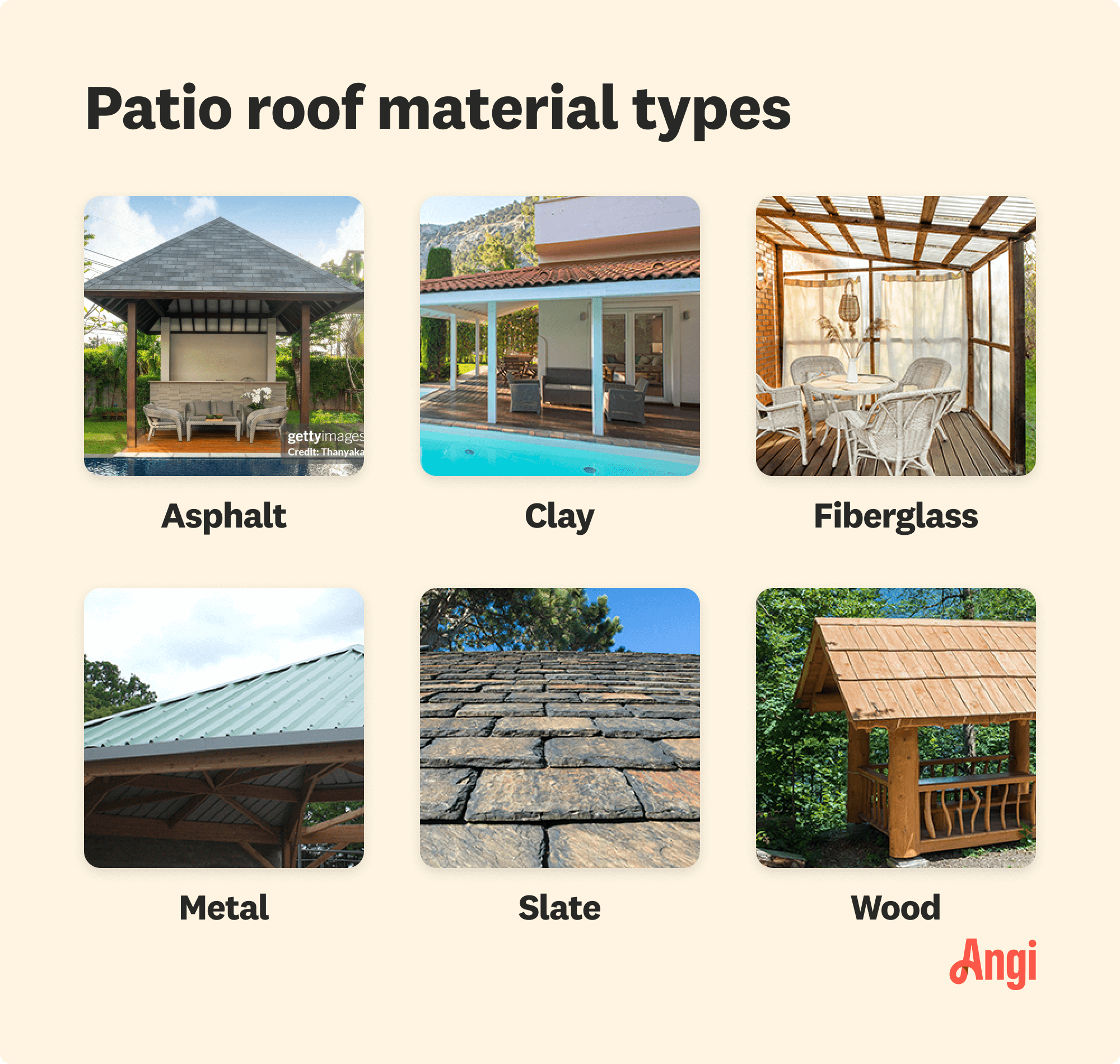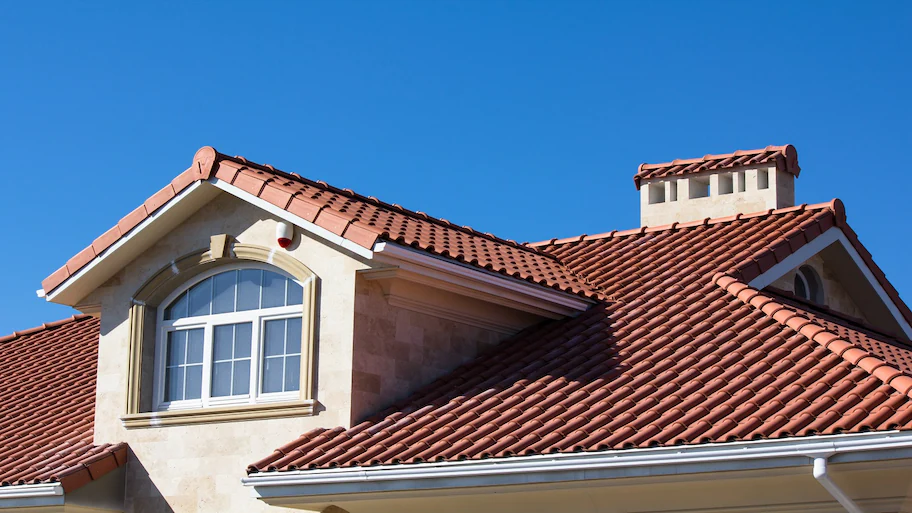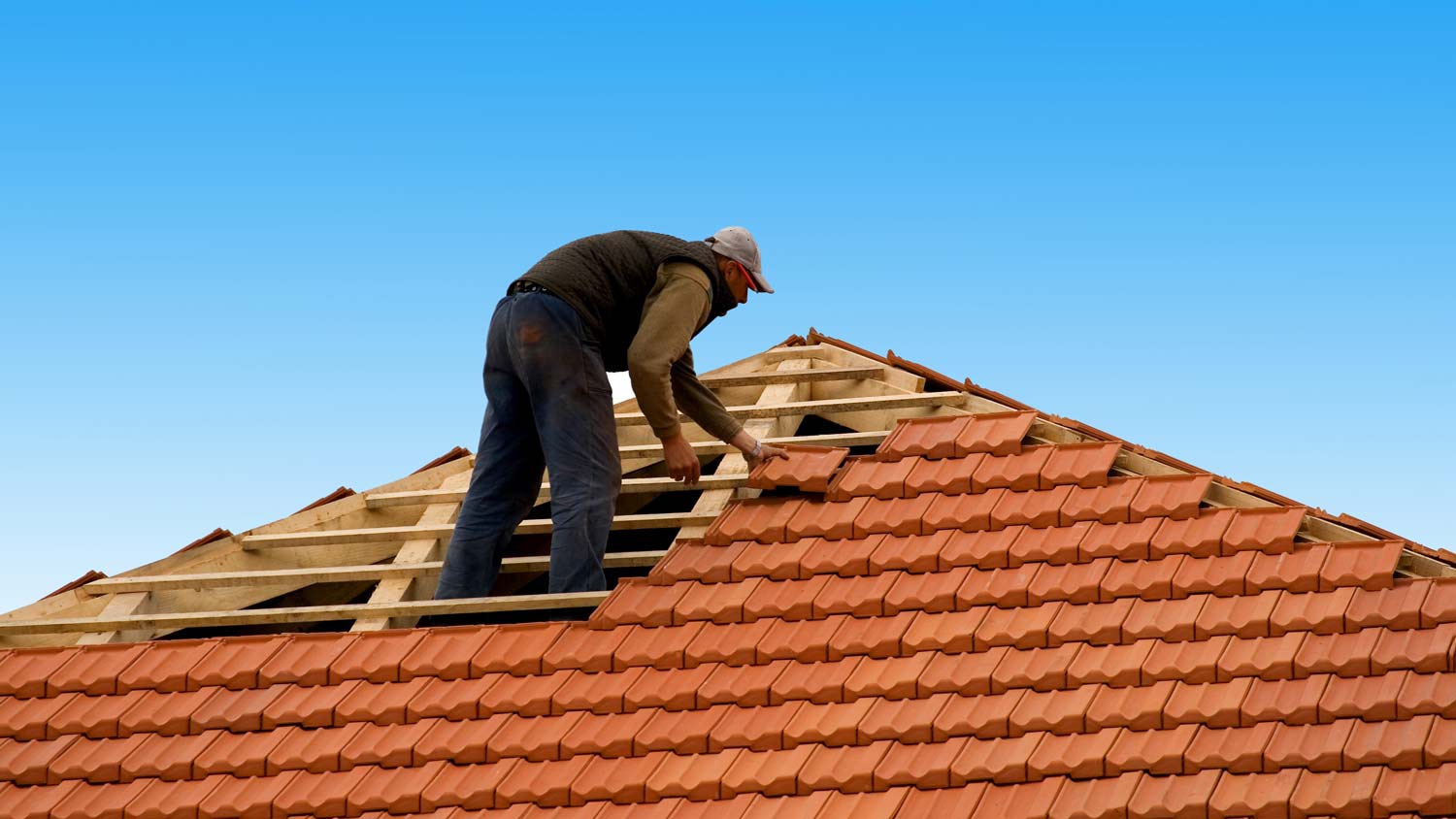
Discover composite roof repair cost estimates. Learn what impacts pricing, how to save, and whether to repair or replace your composite roof.
Installing a patio or deck roof costs an average of $21,000. Most homeowners pay between $14,000 and $31,000, depending on the square footage, type of roof, and material used.


The size of your deck and the complexity of the roof you want are the most influential cost factors to consider.
Roofing materials vary widely in cost, with asphalt shingles being the most affordable and copper standing seam costing nearly ten times as much.
You should consider the cost of adding gutters to your new roof, which will drive up prices but help avoid foundation damage from runoff.
If you want the roof over your deck to match, you may need to consider a roof replacement on your home as well. This will increase costs significantly.
While there are many factors to consider, building a patio or deck roof costs $21,000, on average. This is a cost worth swallowing once you consider the relaxing afternoons and protection from the rain you get from installing one. However, every situation is different, and prices range significantly from $3,000 and $55,000 depending on the size, type of roof, and material used.
Dig into the details of what makes up the cost of a deck or patio roof install. The price is high—but there are ways you can save as well.
The cost to add a roof over a deck or patio fluctuates based on key cost factors like size, material, and roof style.
What style of roof you choose will depend on certain factors, namely the style of your main roof, your budget, and the desired purpose of your deck or patio roof. For those looking for only rain protection, an awning or lean-to fulfills that purpose and at a lower cost. Gabled roofs are the most expensive, but many consider them the most aesthetic (plus, they tend to last a long time). Ultimately, the type of roof you choose is up to you.
| Patio Roof Type | Average Cost to Install |
|---|---|
| Gable | $13,000–$30,000 |
| Pergola | $4,000–$15,000 |
| Louvered | $10,000–$25,000 |
| Lean-to | $6,000–$11,000 |
| Awning | $1,500–$7,000 |
After deciding which type of roof you’re installing, you need to choose the roofing material. Most homeowners try to match the deck or patio roofing with the rest of their house. After all, a house with a metal roof might look a bit strange with an asphalt deck or patio roof.
If you’re looking for more of a greenhouse effect, consider fiberglass roofing, as it’s the only material that allows light penetration. Many believe the diffused lighting effect is a pleasant way to protect from UV and rain. It’s also the least expensive option.
| Roof Material | Cost per Square Foot |
|---|---|
| Fiberglass | $2–$4 |
| Asphalt shingles | $2–$5 |
| Clay tile | $5–$13 |
| Metal | $6–$38 |
| Slate | $9–$25 |
| Wood shakes | $6–$16 |

Increased roof size leads to higher installation costs. This is because bigger roofs require extra support, installation time, insulation, and other materials.
| Patio Size in Square Feet | Average Roof Cost |
|---|---|
| 100 | $3,000–$11,000 |
| 150 | $4,500–$16,500 |
| 200 | $6,000–$22,000 |
| 250 | $7,500–$27,500 |
| 300 | $9,000–$33,000 |
| 400 | $12,000–$44,000 |
| 500 | $15,000–$55,000 |
Expect to pay a roofing professional a project-based fee for this work. A common markup is 20% to 30% of the total project cost and often includes sourcing permits, laying out plans, and completing the work. Hourly rates vary, but the labor cost to build a roof over a deck ranges from $30 to $90 per hour per worker.
If you have plans to install lighting, a fan, a TV, or a sound system, you should hire an electrician. Electricians charge hourly rates from $50 to $130 per hour. Electricians can make more money charging hourly than project-based, so it's not unusual to be quoted in hours versus a total project fee.
General contractors charge about the same as roofing professionals—$30 to $90 per hour per worker or around 25% of the total project cost. The vast majority of them will do a great job, but if the costs are similar, it's better to go with a dedicated roofing professional.
The professional you hire will plan for structural support. Unlike some other jobs, there shouldn’t be much demolition work and the prep work (outside of constructing load-bearing beams or roof frames) will likely be limited to cleaning work.
Installing a deck or patio roof will require building permits in almost every instance. Homeowners can expect to pay between $200 and $1,400 for a permit. Many people don’t have experience submitting plans for permit approval, so lean on the professional you hire to help.
Over time, you might need to carry out roof repairs. Repairs can range from $75 up to around $1,000 or more. The total cost will depend on the type of damage, how extensive it is, and the roof material you have over your patio.
Building a deck or patio roof is best handed off to the pros, even for the most experienced DIYer. While you may be a great carpenter, it’s a whole different ballpark when you’re high aboveground. For a successful and smooth project, hire a roofer near you.
Consider these upsides to hiring a roofer for your deck or patio roof:
Pros are familiar with local building codes to help ensure your new deck or patio roof is built in accordance with regulations.
A properly built deck or patio roof is structurally sound, so you can enjoy your outdoor area with peace of mind.
Roofers are experienced with working safely aboveground and have the necessary tools.
The pros can help you design and choose the best roofing materials for your climate and budget.
A professionally installed deck or patio roof will look seamless with the rest of your roof and increase your home’s value.
You’ll avoid the potential pitfalls of a DIY job, such as the risk of injury, an improper installation causing water leaks, or failing to install load-bearing posts correctly.
Let’s assume you already have a deck or patio roof installed. Some damage appears and you’re wondering whether to replace the roof or repair it. There are two factors that determine the answer:
Will the repair cost as much or more than 50% of a replacement?
Does the repair affect the structural components of the roof?
If the answer is yes to either of these questions, you should replace the roof. You can take chances on certain repairs—structural ones, especially ones that literally hold a roof over your head, are not repairs you should DIY or put off until later.
If you’re looking to create the ultimate outdoor entertainment area, consider some of the following add-ons:
Ceiling fans: $250–$600
Outdoor sound system: $300–$2,600
Outdoor TV: $150–$2,200
Solar shades: $100–$300
Outdoor kitchen: $5,000–$26,000
Instead of negotiating labor costs, focus on the cost of the materials. Ensuring you get the best material at the best price comes down to working a few angles. Some things you can do to lower the cost of a deck or patio roof are:
Choose an affordable material: Roofing materials range from around $2 up to $38 per square foot.
Limit the roof coverage: Covering your entire patio with a roof isn’t always necessary, and you could save money by just covering a small seating area allowing for both sun and shade.
Use recycled materials.
Consider extras carefully: Add-ons like outdoor kitchens and skylights can quickly bump up your installation costs. Consider avoiding nice-to-haves to keep your upfront costs as low as possible.
Keep the design simple: Simple roof designs with few bump-outs and just a single ridge will reduce the materials needed, as well as the labor required for the installation.
Book in the offseason.
Get multiple quotes: Finally, get at least three quotes for your project to ensure you get a fair deal.
Be prepared to discuss the vision you have for your new patio or deck roof, including the type and the material you would like to use.
Ask your roofer for recommendations as to which options will work best with your existing deck or patio.
Consider the size of the roof you’d like—whether you’d like one that covers your entire patio or deck, or if you want a smaller one.
While most roofers don’t handle add-ons like solar shades and outdoor kitchens, let your pro know your plans so they can advise you on the shape and size of your deck or patio roof.
Home is the most important place on earth, which is why Angi has helped more than 150 million homeowners transform their houses into homes they adore. To help homeowners with their next project, Angi provides readers with the most accurate cost data and upholds strict editorial standards. We extensively research project costs to develop the pricing data you see, so you can make the best decisions for you and your home. We rely on reputable sources, including the U.S. Bureau of Labor Statistics, academic journals, market studies, and interviews with industry experts—all to ensure our prices reflect real-world projects.
Want to help us improve our cost data? Send us a recent project quote to [email protected]. Quotes and personal information will not be shared publicly.
From average costs to expert advice, get all the answers you need to get your job done.

Discover composite roof repair cost estimates. Learn what impacts pricing, how to save, and whether to repair or replace your composite roof.

A new roof improves curb appeal, increases home value and keeps your living space protected from the elements. Learn about average roof replacement costs to set your budget.

The cost to replace roof vent boots depends on a few factors, like the size of the vent, its location, and your existing roof material.

Find out the average tile roof repair cost, key price factors, and ways to save. Get expert tips to plan your tile roof repair project with confidence.

Not sure if you need a new roof yet? Check out these warning signs that you need a new roof to catch roof problems early.

Homeowners can fill a gap between their roof and wall with sealant or wire mesh. Here are three steps to help you get the project done safely.